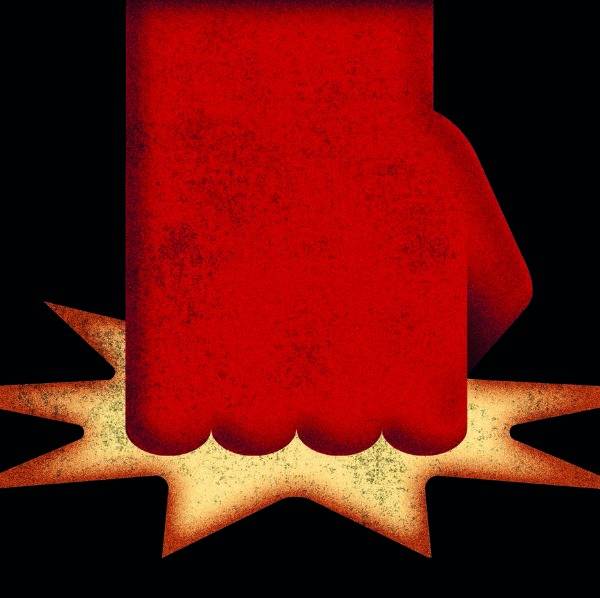On September 17, Global Darfur Day saw a coordinated media effort, spearheaded by movie stars George Clooney and Mia Farrow, to raise public awareness about what was billed as the coming genocide in western Sudan. Tens of thousands marched in cities across the world. Among the core recommendations of the organisations behind the day was that the undermanned and underfunded African Union force, which was failing to protect civilians in Darfur, be replaced by a multinational UN peacekeeping force of 22,000 soldiers. There was also talk of sanctions if the Khartoum government, widely thought to be behind the Janjaweed attacks on unarmed civilians in the region, refused to co-operate. The stage was set for a classic confrontation between good – the UN, George Clooney, global public opinion – and evil – the authoritarian government of Omar Hassan Al-Bashir and the anti-western Islamic forces that support him.
It would probably be bad taste to point out that a similarly glitzy public outcry was conspicuously absent as 4 million died in the civil war in the Congo or about the 1.6 million dead and displaced in Uganda.
This doesn’t mean, however, that we should withold all credit for cureent attempts to sound the alarm. Failure to prevent previous No doubt the motives of the marchers and the celebrities were entirely honourable. The trouble is that the inevitable simplification involved in turning Darfur into a designer crisis risks being part of the problem it is trying to fix. Neither pious pronouncements from celebrities about sending in the UN or imposing sanctions can bring about a solution to a situation as long-running, as intractable and as complex, as that which is unfolding in Africa’s largest country.
Perhaps I would have been more sympathetic to the Clooney message if I hadn’t, on September 3, stepped on to the tarmac at Khartoum airport and into an atmosphere of palpable crisis. I was travelling with thirteen academic colleagues as part of a delegation from Conscience International, a non-profit volunteer group dedicated to implementing humanitarian relie programmes through cooperation.
Because the group is non-governmentaland non-partisan we are often able to gain access and initiate dialogue in a way that diplomats are not. Previously I have been to Tehran and Damascus with CI, trying to use citizen diplomacy where the more formal version was conspicuously failing.
Nominally we were in the Sudan to participate in a two-day conference on Darfur that would be attended by a host of leading Sudanese politicians and academics. Our aim was, of course, to build bridges and perhaps offer some suggestions to end the crisis. Crucially, we were not acting as emissaries for the US government, the UN or any other body. Our independence, we hoped, might make us useful. Part of our ‘acclimatisation’ involved a trip out to thhe large refugee camp at El Fasher, in the heart of Darfur.
Darfur, which constitutes the western part of the Sudan currently houses 153 squalid refugee camps for what amounts to millions of internally displaced persons. These people fled their villages to escape the Sudanese military and the armed Muslim bandits on horseback – known as the Janjaweed – organised and funded, it is plausibly alleged, by the Al-Bashir government to quell the ongoing rebellion in the region.
The camps are hellish. Hunger, thirst, disease, filth, threats of rape and violence, and a stultifying idleness abound in this sea of thatched huts, flimsy tents and mud streets. The refugees wish only to return to their villages. But repatriating them, rebuilding their homes and compensating the victims for what they have undergone will prove a huge and expensive undertaking. Along with the unwillingness of the government to disarm the Janjaweed, issues of this sort are at the root of the controversy concerning implementation of the Darfur Peace Agreement of May 2006.
A new bombing campaign by Khartoum against Darfur has driven tens of thousands more villagers into the camps. There is the ever present threat that the government might deploy the substantial force they have on standby to drive the refugees over the border into Chad (some 200,000 have already crossed the border). Since the peace deal, when the Government promised to disarm the Janjaweed, 7000 African Union troops had been stationed in Darfur. But they had been harshly criticised for their incompetence and inexperience, and had not been able to stem the violence. They claim they are seriously underequipped.
When we arrived in Khartoum there was less than a month to go before the AU mandate expired. On 31 August, the UN Security Council passed a resolution calling for the ‘re-hatting’ of some of them, adding a few thousand civilian police and mixing them with roughly 17,000 troops sent by the UN. Under the auspices of the UN this force would be used to protect the refugees from the Janjaweed and the Sudanese military in the future.
But President Al-Bashir was adamant in his refusal either to extend the mandate of troops from the African Union or to allow the UN the right to intervene in Sudanese affairs.
For many outside Africa this must have appeared straightforward – an authoritarian Islamic dictatorship refusing a reasonable and humanitarian proposal by the UN. But this is to overlook both the impracticality of the proposal that the UN sort it out, and the justifiable concerns in Africa about the UN. In Khartoum no less than in Tehran or Tripoli anti-western radicals argue that the UN is nothing more than a front for ‘imperialist powers’ intent upon ‘re-colonising’ the Sudan. Such charges are mostly self-serving propaganda. But the toppling of the Taliban in Afghanistan, the American occupation of Iraq and the generally bellicose policy of the Bush administration lent credibility to such charges.
Because it has often been a tool of western ‘great power’ interests, and also because vetoes on so many resolutions have been made by the United States on behalf of Israel, the political intentions of the UN are still generally greeted with suspicion in much of the previously colonised world. They may not be the whole story but to proceed as if such assumptions don’t exist, or are irrelevant, is arrogant in the extreme. And alongside the question of diplomatic sensitivity come the harder edged practical considerations.
Little thought has been given to the logistics and the realistic mandate of a UN force alien to the terrain and the culture of Darfur, patrolling an area of 290,00 square kilometres. Nor has there been consideration of the parlous state of the UN coffers or the precise mission of these troops.
Many refugees would undoubtedly welcome the UN. That is also true of some of the rebel groups like the Justice and Equality Movement led by Khalil Ibrahim, and Abdelwahid Mohamed al-Nur’s Sudanese Liberation Movement. But on our visit we met representatives from many of the tribes – including those from the politically powerful Zagawa and Rizgat tribes – who candidly told us that their people would resist any ‘invading’ force, peacekeeping or not.
Eighty tribes in the Sudan have their own militias, previous peace agreements are in doubt, Islamic fundamentalists loyal to al Qaeda are training in the Jebel Marra Mountains and the country seems set to implode. Neither UN intervention, nor rampingup sanctions is the solution. What’s more, in spite of all the hard-line public rhetoric, I was told again and again that Khartoum was looking for an exit – “with honour” – from the crisis its leaders had created.
We did our best, in the meetings we had, to explore what this might be. In the panel I attended, which included former Sudanese Ambassador to the United States Charles Manyang and government minister Dr. El-Tijani Mustafa, I employed a calculatedly conciliatory tone, arguing that the African Union rather than the UN should decide which humanitarian agencies should be allowed entry into Darfur, and that charges of war crimes against government figures should not be pursued. (The need to cooperate with Khartoum to address the humanitarian crisis, in my view, outweighs the requirements of international justice, at least for now.)
With these softeners on the table I argued that the mandate of the AU should be extended and its role strengthened. I tried to make clear that the UN was not synonymous with the Security Council – which is stacked in the West’s favour – and outline a way forward where the UN, Sudan and the AU could cooperate to end the violence.
And now? The number of internally displaced people continues to grow. Death and disease remain rampant, and armed militias continue to prevent the work of humanitarian agencies. Yet, in an interview with South Africa News on October 26, Sudan’s president Omar Al-Bashir, while steadfastly refusing to concede to the UN Security Council’s request to let 20,000 UN troops into Darfur, said he is willing to accept an increase in the number of foreign peacekeepers, as long as they stay under African Union control.
Perhaps there is now an opening for a new approach that might foster investment, seek sustained funding for the repatriation of refugees, strengthen the African Union and integrate the Sudan into the world community. ■
Stephen Eric Bronner is Professor of Political Science at Rutgers University. His most recent book is Blood in the Sand: Imperial Fantasies, Right-Wing Ambitions, and the Erosion of American Democracy (University Press of Kentucky, 2005)

